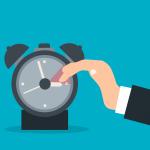We all need sleep; it is a biological imperative right up there with eating and reproducing. A recent study I reported indicated that we sleep 9.1 hours a day.
social jetlag
From an evolutionary point of view, we live on a planet with an established pattern of light and dark, so it is not a giant leap to consider that synchronizing our body’s physiology to match that pattern has some advantages.




